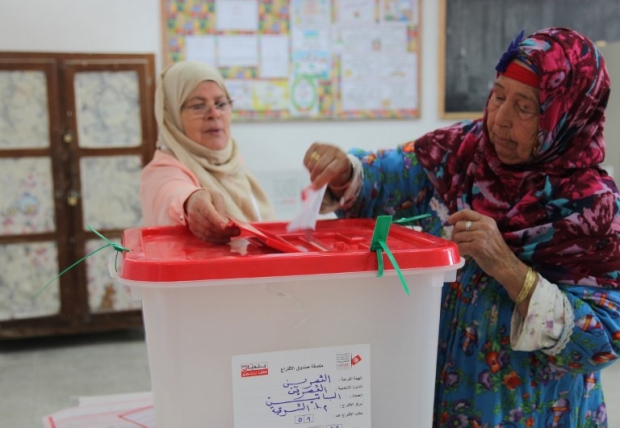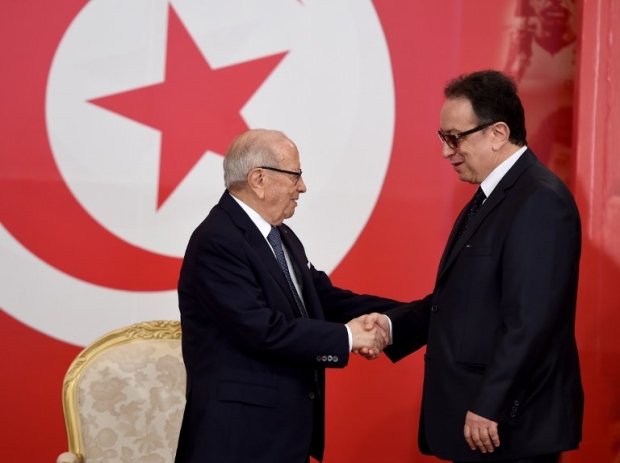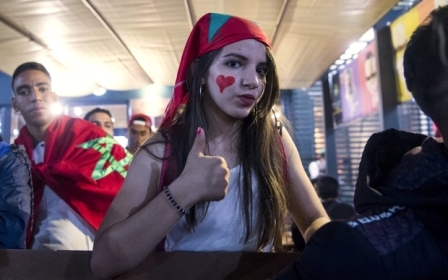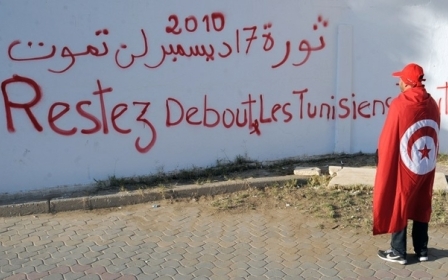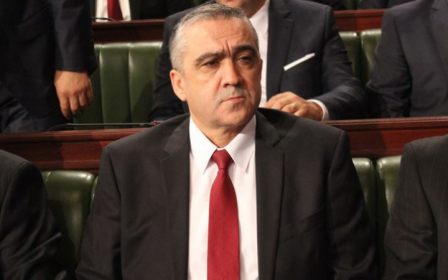How a battle inside this Tunisian political party is paralysing the country
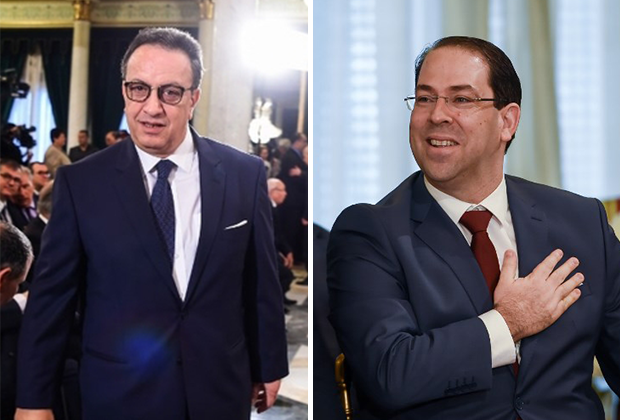
TUNIS - The fate of Tunisia’s prime minister hangs in the balance after the power struggle between him and the president’s son derailed national negotiations called to address much-needed reform.
Crucial talks between trade unions and political parties over the Carthage II Agreement, an economic and social blueprint, fell apart late last month over disagreement about whether Youssef Chahed should step down.
'This dispute will damage Tunisia because it is happening during a critical social and economic moment, and in the absence of real solutions to main issues'
- Salaheddine Jourchi, political analyst
The 42-year-old prime minister has been at the helm during difficult times over the past two years, which have seen major protests and political struggles in the country.
But perhaps the biggest struggle comes from within his own political party, Nidaa Tounes – and from Hafez Caid Essebsi, the party’s executive director and the son of Tunisian President Beji Caid Essebsi.
The ongoing battle between the two politicians was brought to a head last month after Nidaa failed to secure a victory in the country’s municipal elections, sparking a political blame game.
In recent weeks, Hafez Caid has called for Chahed to resign, pinning the country’s continued economic and social woes on the prime minister. Chahed, meanwhile, has said that Essebsi has used his family connections to control state institutions and has turned Nidaa Tounes into a party he no longer recognises.
Now, as the parties concerned look to reignite the Carthage II discussions and Nidaa calls for a new coaltion government, Chahed's future remains up in the air. Some go further, saying this personal power struggle is threatening Tunisia's stability.
Political analyst Salaheddine Jourchi told Middle East Eye: “This dispute will damage Tunisia because it is happening during a critical social and economic moment, and in the absence of real solutions to main issues like the depreciation of the dinar, the lack of development projects and the increase in unemployment.”
Fragile from the beginning
Since its founding in 2012, Nidaa Tounes leaders have struggled to maintain harmony within their party.
Largely formed with the purpose of opposing the Islamist Ennahda party, Nidaa brought together an odd assortment of members, from members of the former ruling party to businessmen to trade unionists, who didn’t necessarily have much in common.
'What stability do you want to maintain? Stability in the deterioration of the purchasing power of the Tunisian people? Stability in the terrible collapse of all economic indicators?'
- Hafez Caid Essebsi, Nidaa Tounes executive director
When the party reached its goal of winning legislative and presidential elections in late 2014, the cracks between its many tribes started to show. One major grievance was the influence and power that Hafez Caid Essebsi – named by his father as the party leader in May 2014 – attempted to wield over Nidaa.
Many party leaders resigned, including former secretary-general Mohsen Marzouk, who left Nidaa in December 2015, along with several other party officials, to start the "Tunis Project" movement.
Tensions flared last May when Chahed launched a serious anti-corruption drive that saw Chafik Jarraya, a key Nidaa donor and activist, arrested on day one, leaving some officials with the sense that the campaign was specifically targeting their party.
Accused of high treason and putting himself as the disposal of a foreign army, Jarraya was sentenced to life in prison by a military court last month.
Since then, several other key business figures in Nidaa and their supporters have been targeted, fuelling further tensions among those who support the campaign and those who believe Chahed is damaging the party to promote himself.
But it was the party’s loss in local elections last month that really kicked the spat between Chahed and Hafedh Caid Essebsi into a higher gear.
In the wake of the less-than-spectacular election results - and with the 2019 parliamentary and presidential polls on the horizon - President Essebsi called for the resumption of the Carthage talks in late May.
It was at these talks on 22 May that his son insisted that Chahed be removed from his position, saying that he had failed to stem the country’s economic problems.
A day later, he wrote on his Facebook page that Chahed’s government had failed at all levels, that a change was necessary and that this was why his party was asking Chahed to step down.
“What stability do you want to maintain? Stability in the deterioration of the purchasing power of the Tunisian people? Stability in the terrible collapse of all economic indicators? Stability in the collapse of the value of the dinar?” he wrote.
On 27 May, he posted again, saying that Nidaa’s push for a government reshuffle was needed because of the critical economic situation, public protests and the loss of confidence among the Tunisian people, who fear the collapse of democracy in their country.
“The country’s stability isn't guaranteed by this government or another, but takes its strength and guarantee and legitimacy from national political agreement between parties and national organisations,” Essebsi wrote.
It was this last posting, in particular, that sparked controversy across the country.
Wafa Makhlouf, a Nidaa party deputy, told Mosaique FM that Essebsi was becoming a member of the opposition and had failed the party, reminding listeners of the resignation of many of the party leaders.
Former head of Nidaa, Lazhar Akremi, posted on Facebook that Essebsi should be arrested to save the country, and free his father to rule.
On 29 May, Chahed responded during a televised speech in which he accused the president’s son of destroying Nidaa Tounes and allowing tensions to overflow from the party into state institutions.
He discussed his government’s achievements, acknowledged there was work to be done and pledged that he continue with the necessary reforms. “Responsibility is honesty,” he said, adding that he wouldn’t run from it.
The party's deepening crisis
It was the first time Chahed had criticised Hafezh Caid Essebsi directly, accusing him of abusing his family’s power to control state institutions. Essebsi has denied the accusations, saying he is only exercising the political right allotted to everyone.
Following the speech, former Nidaa Tounes MP Sahbi Ben Fredj, who left the party to join the "Tunis Project" movement, wrote on Facebook that Chahed’s comments explained why he and others had quit the party.
“We have 16 months [ahead of the 2019 elections] to fix what selfishness, personal ambitions, and wrong has ruined, and we have no time to waste on side disputes (mostly personal) that will make us miss the historical moment and we will be judged for all time,” he wrote.
Nidaa Tounes politician Sabrine Gobantini welcomed the speech, telling Mosaique FM that the prime minister chose to speak honestly to the people.
'We have 16 months to fix what selfishness, personal ambitions, and wrong has ruined, and we have no time to waste on side disputes'
- Sahbi Ben Fredj, Nidaa Tounes deputy
“Everybody knows the role of Hafedh Caid Essebsi in assignments and his influence on ministers,” she said, adding that he is attempting to push out Chahed because he doesn’t like him.
But many other Nidaa Tounes members refused to say anything about the speech - or when speaking of it, said the situation couldn’t bear any more tension.
Nidaa MP Mohamed Jalel Ghedira told MEE: “Changing Youssef Chahed or keeping him until the 2019 elections is a parliamentary matter. The parties that would negotiate his dismissal don’t have the decision power on the matter and must respect the constitution.”
Still up in the air
On 29 May, President Essebsi suspended the Carthage II discussions after the political parties involved in the talks disagreed over Chahed’s fate.
While Nidaa Tounes, the Tunisian General Labor Union and the National Union for Tunisian Women reportedly called for Chahed to be replaced, Ennahda, the National Destourian Initiative, the Social Democratic Path and the Tunisian Union of Agriculture and Fishery labour organisation wanted the prime minister to stay.
It is unclear when Essebsi will call for the talks to resume. In the meantime, the prime minister’s fate remains up in the air.
A Nidaa Tounes spokesperson refused to make a statement about the dispute to MEE, preferring to wait until the results of a party meeting, which has yet to be announced. Several other Nidaa Tounes MPs refused to comment.
However, Bechir Khlifi, deputy of the Ennahda party, told MEE that his party might retreat from its original position of keeping Youssef Chahed as prime minister.
Ennahda, Khlifi said, will restart a dialogue with Nidaa Tounes about Chahed’s fate and will take into consideration what his impact would be on needed economic and social repairs before making their decision.
This article is available in French on Middle East Eye French edition.
Middle East Eye propose une couverture et une analyse indépendantes et incomparables du Moyen-Orient, de l’Afrique du Nord et d’autres régions du monde. Pour en savoir plus sur la reprise de ce contenu et les frais qui s’appliquent, veuillez remplir ce formulaire [en anglais]. Pour en savoir plus sur MEE, cliquez ici [en anglais].


